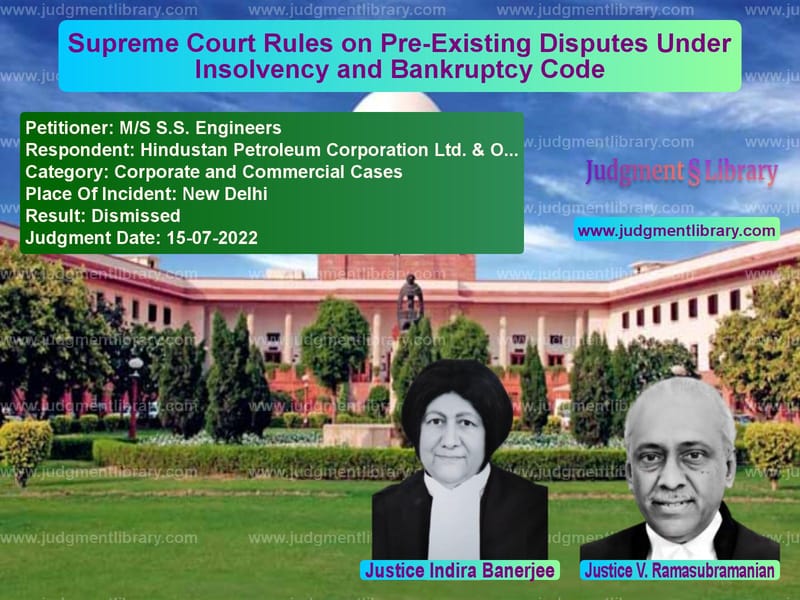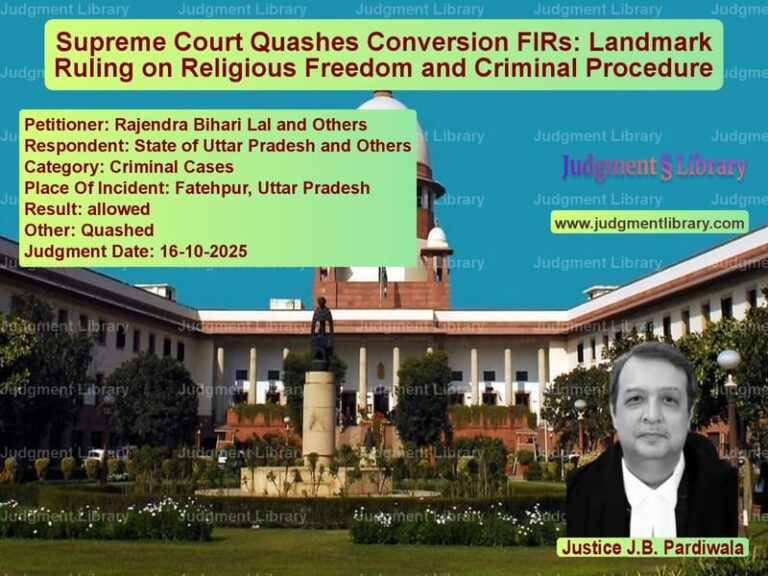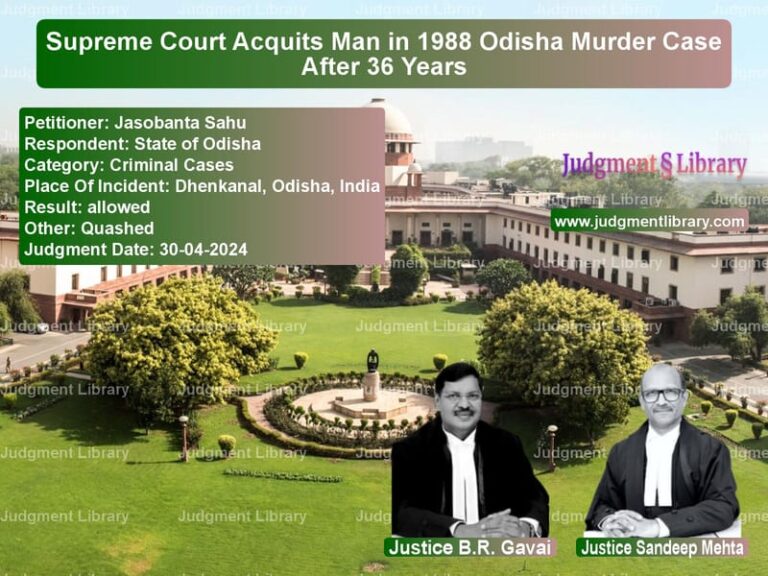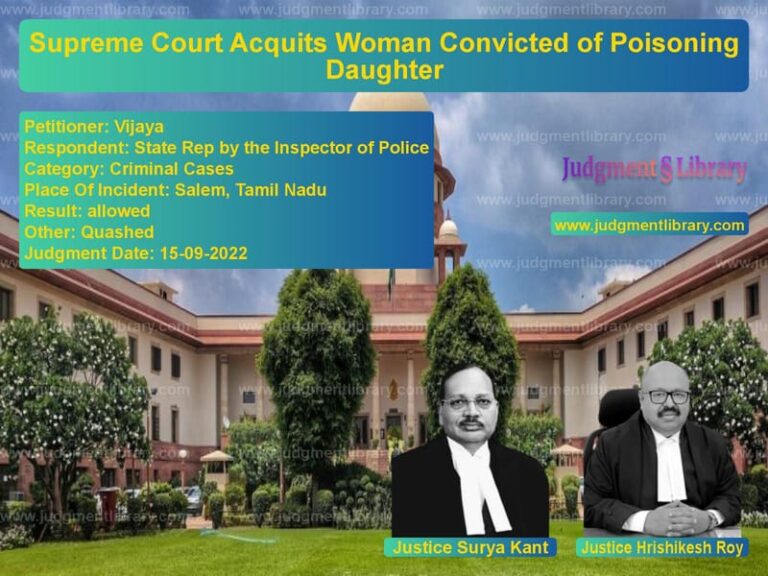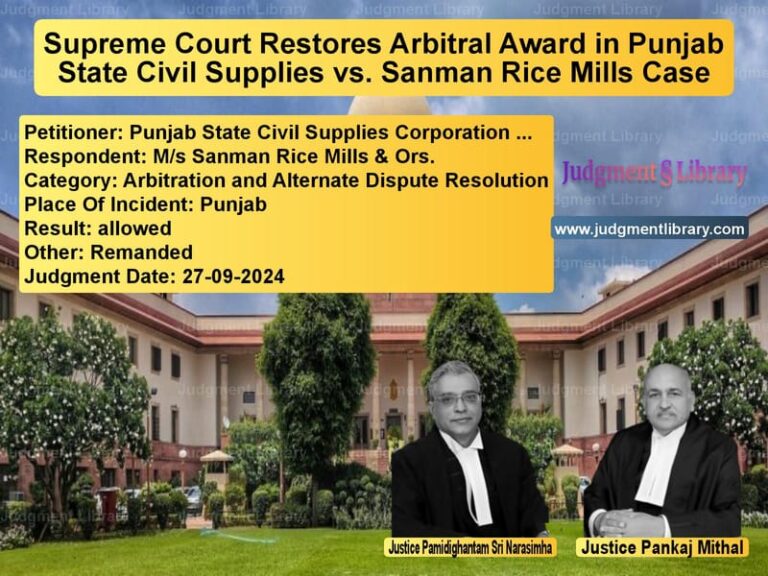Supreme Court Rules on Pre-Existing Disputes Under Insolvency and Bankruptcy Code
The Supreme Court of India, in the case of M/S S.S. Engineers vs. Hindustan Petroleum Corporation Ltd. & Ors., held that pre-existing disputes between parties bar the initiation of the Corporate Insolvency Resolution Process (CIRP) under the Insolvency and Bankruptcy Code (IBC), 2016. The judgment reaffirmed that IBC is not a recovery mechanism but a means to resolve genuine cases of corporate insolvency.
Background of the Case
The dispute arose when M/S S.S. Engineers, an operational creditor, filed an application under Section 9 of the IBC against HPCL Biofuels Ltd. (HBL), a wholly owned subsidiary of Hindustan Petroleum Corporation Ltd. (HPCL). The application sought the initiation of CIRP against HBL for non-payment of alleged dues amounting to Rs. 18.12 crores.
The National Company Law Tribunal (NCLT), Kolkata, admitted the CIRP application, rejecting HBL’s contention that pre-existing disputes rendered the claim inadmissible under the IBC. However, the National Company Law Appellate Tribunal (NCLAT) overturned the NCLT’s ruling, directing the closure of CIRP proceedings against HBL.
Challenging the NCLAT decision, M/S S.S. Engineers approached the Supreme Court.
Key Legal Issues
- Whether the existence of a pre-existing dispute bars an operational creditor from initiating CIRP under Section 9 of the IBC.
- Whether the NCLT exceeded its jurisdiction by admitting the CIRP application despite documented disputes between the parties.
- Whether the IBC can be used as a tool for debt recovery in cases involving genuine contractual disputes.
Petitioner’s (M/S S.S. Engineers) Arguments:
- The company had supplied materials and rendered services to HBL as per various purchase orders, and payments were outstanding since December 2013.
- The alleged disputes raised by HBL were a mere afterthought and did not constitute genuine disputes under the IBC.
- The issuance of C-forms by HBL under the Central Sales Tax Act indicated acknowledgment of liability.
- The NCLT rightly admitted the CIRP application as the claim exceeded the statutory threshold of Rs. 1 lakh.
Respondent’s (Hindustan Petroleum Corporation Ltd. & Ors.) Arguments:
- There was a documented pre-existing dispute between the parties regarding project delays, substandard work, and financial claims, evident from correspondence dating back to 2013.
- Letters dated 02.01.2014 and 11.04.2014 explicitly disputed the claims, highlighting issues of non-performance by M/S S.S. Engineers.
- HBL had raised debit notes against the petitioner, counterclaiming Rs. 1.49 crores due to poor service quality.
- IBC was being misused as a debt recovery mechanism, contrary to its intended purpose.
Supreme Court’s Observations and Ruling
The Supreme Court dismissed the appeal and upheld the NCLAT’s ruling, emphasizing that the existence of pre-existing disputes nullifies an operational creditor’s right to initiate CIRP. Key observations included:
- Sections 8 and 9 of the IBC require the Adjudicating Authority to reject applications where a ‘genuine dispute’ exists between the parties.
- The IBC is designed to resolve cases of corporate insolvency, not to be a tool for debt enforcement.
- The correspondence between the parties, dating back to 2013-2014, demonstrated a long-standing contractual dispute.
- Issuance of C-forms does not amount to an acknowledgment of liability under the IBC.
- The operational creditor had, in 2016, itself proposed arbitration for dispute resolution, proving the existence of disputes.
The Supreme Court stated:
“The NCLT and NCLAT are not recovery forums. The object of the IBC is to provide a resolution mechanism for corporate insolvency and not to penalize solvent companies for non-payment of disputed claims.”
Key Takeaways from the Judgment
- Pre-existing disputes bar operational creditors from initiating CIRP under Section 9 of the IBC.
- The IBC is not a debt collection mechanism but a tool for resolving genuine insolvency cases.
- Courts will examine the nature of disputes before admitting CIRP applications.
- Correspondence between parties and prior arbitration notices are key indicators of disputes.
- Even if a debt is unpaid, if a dispute exists, the CIRP application must be rejected.
Impact of the Judgment
- Ensures that the IBC is used for genuine insolvency resolution, not debt recovery.
- Strengthens the rights of corporate debtors against frivolous insolvency applications.
- Encourages contractual dispute resolution through arbitration or civil courts instead of IBC proceedings.
- Provides clarity to creditors on the importance of resolving disputes before initiating CIRP.
Conclusion
The Supreme Court’s ruling in this case upholds the fundamental principle that insolvency proceedings should not be initiated for disputed debts. The decision reinforces that creditors must exhaust other dispute resolution mechanisms before resorting to IBC. This landmark ruling will shape how courts interpret pre-existing disputes in insolvency cases and ensure that the IBC remains a tool for genuine corporate restructuring and insolvency resolution.
Petitioner Name: M/S S.S. Engineers.Respondent Name: Hindustan Petroleum Corporation Ltd. & Ors..Judgment By: Justice Indira Banerjee, Justice V. Ramasubramanian.Place Of Incident: New Delhi.Judgment Date: 15-07-2022.
Don’t miss out on the full details! Download the complete judgment in PDF format below and gain valuable insights instantly!
Download Judgment: ms-s.s.-engineers-vs-hindustan-petroleum-supreme-court-of-india-judgment-dated-15-07-2022.pdf
Directly Download Judgment: Directly download this Judgment
See all petitions in Bankruptcy and Insolvency
See all petitions in Corporate Compliance
See all petitions in unfair trade practices
See all petitions in Judgment by Indira Banerjee
See all petitions in Judgment by V. Ramasubramanian
See all petitions in dismissed
See all petitions in supreme court of India judgments July 2022
See all petitions in 2022 judgments
See all posts in Corporate and Commercial Cases Category
See all allowed petitions in Corporate and Commercial Cases Category
See all Dismissed petitions in Corporate and Commercial Cases Category
See all partially allowed petitions in Corporate and Commercial Cases Category

